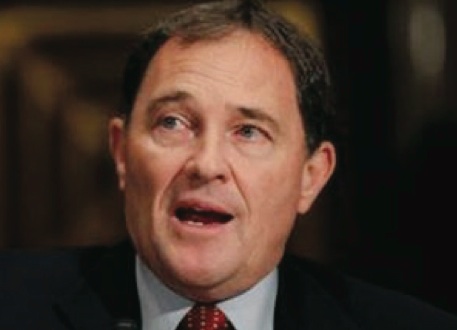
Rural Nevadan’s fighting the Las Vegas water grab got a big boost in their effort from the governor, Governor Gary Herbert of Utah that is.
In an 11th hour decision Herbert reversed himself and said he would not sign a controversial water-sharing agreement with Nevada.
“At the end of the day, when it comes down to those people who have the most to lose — it’s their water, their lifestyle, their livelihood — I can’t in good conscience sign the agreement,” he said. “It’s that simple.”
“The people out in the west desert, in Juab, Millard and Tooele counties, the county commissioners don’t want it, the people don’t want it,” he said. “Estimates are 80 percent of the people don’t want it.”
Herbert’s decision was praised not only in Utah but also in rural Nevada where ranchers, miners and townsfolk have been fighting the water grab for almost 20 years.
Until Herbert’s decision opponents of the water grab felt completely alone in their battle. In the last year, the estimated $15 billion pipeline had won approval from the Nevada State water engineer; the project environmental impact study was okayed ; and the project had the endorsement of the Nevada political establishment.
[media id=1 width=320 height=240]
While Herbert’s rejection of the agreement will not end the project it could put the project back on hold for several years.
“This agreement was negotiated over many years and in good faith,” said Leo Drozdoff, director of the Nevada Department of Conservation and Natural Resources. “We are disappointed by this decision and are evaluating all of our options in light of Gov. Herbert’s decision.”

Herbert’s refusal to sign comes nearly four years after the agreement was drafted, a decision put in limbo because of challenges that had to be settled by the Nevada courts, protests over water rights and a federal agency completing an environmental analysis.
The two states have negotiated for years over the division of water from an aquifer in Snake Valley, which straddles the border and is home to small ranching and farming communities.
Utah has been under pressure to sign the agreement, with threats of a lawsuit voiced from Nevada quarters.
Herbert said he is not worried about winding up in court over the lack of agreement with Nevada.
 “I’m not worried about a lawsuit at all,” he said. “If they bring that, we will address it when the time comes.”
“I’m not worried about a lawsuit at all,” he said. “If they bring that, we will address it when the time comes.”
And every day of delay is a victory for opponents to the water grab.
“We are definitely in this for the long haul,” said Abby Johnson a Board Member of the Great Basin Water Network. “We are appealing the ruling and depending on the EIS (environmental Impact statement) we could appeal that finding. If anything we in rural Nevada are more united, more ready to fight than we ever were.”
Last summer the Snake Valley Festival held in Baker, Nevada appeared to back up Johnson’s words. Only in its fourth year of existence the festival raised closed to $10,000. Perhaps a meager sum in Las Vegas but enough to keep lawyers filing appeal after appeal and seeking injunction after injunction for years if not decades into the future.
“I really don’t think the SNWA realized who they were dealing with back in 1990.” Johnson said. “These are ranchers who have lived here for seven or eight generation, tribes who have been here thousands of years We can’t lose this fight because if they take our water we lose our homes our livelihoods. It is a question of survival.”
 The SNWA has tried just about everything to get the rurals to back down. Running the gamut from vinegar to honey back to vinegar, the rural north has refused to budge and according to legal experts the fight has at least another 10 years and probably double that in the various courts before the SNWA could even think about declaring victory let alone actually winning it.
The SNWA has tried just about everything to get the rurals to back down. Running the gamut from vinegar to honey back to vinegar, the rural north has refused to budge and according to legal experts the fight has at least another 10 years and probably double that in the various courts before the SNWA could even think about declaring victory let alone actually winning it.
In the twenty plus years since the first filing a major plank of Las Vegas’ argument was shattered by the Great Recession. Four years after the economic downturn hit the Las Vegas economy has still not recovered, unemployment is still in the double digits whole neighborhoods are still empty and the exponential growth and unquenchable thirst are still on time out.
“The downturn proved our point,” Johnson added. “The line that Las Vegas was always going to grow was proven wrong.”
The downturn for Las Vegas also raised the serious question of whether the city could actually afford the $15 billion project or muster the political will to raise water rates to pay for it.
In addition to adding time to the project, Herbert’s refusal is another embarrassment to the SNWA already under scrutiny for alleged waste and mismanagement.
“The Southern Nevada Water Authority has spent huge sums of public money to gobble up a string of rural ranches because of the water underneath them. SNWA claims the ranches are operating in the black, but a whistle blower has come forward to tell a much different story.” Reads and investigative news story this year from Las Vegas CBS affiliate channel 8.
 Prepared by Chief Investigative Reporter Charles Knapp the story details not only the millions of dollars above market prices the SNWA paid for a hand full of rural Nevada ranches but also the ranches are being run at a loss.
Prepared by Chief Investigative Reporter Charles Knapp the story details not only the millions of dollars above market prices the SNWA paid for a hand full of rural Nevada ranches but also the ranches are being run at a loss.
“This story was the best thing to happen for us in a long time,” said Denys Coyle, owner of Baker’s Border Inn and one of the leaders in the water fight with the SNWA. “It really damages their credibility and their assertions. Folks in Las Vegas should be asking if they can’t run a ranch how are they going to manage a multi billion dollar water pipeline system?”
The chief source of the story is identified as Debra Rivero, a former SNWA employee.
Rivero worked for the water district in Las Vegas for 17 years before moving north to run the office for the ranches. From the beginning, she said, she was struck by how little oversight there was by SNWA.
Perhaps in response to the story a bill has been introduced in the Nevada legislature to bring the SNWA until the control of the Public Utilities Commission.

